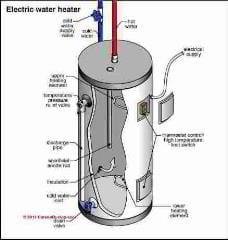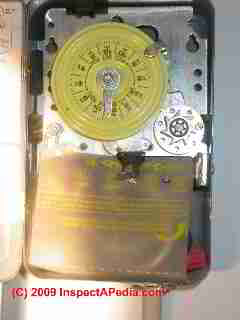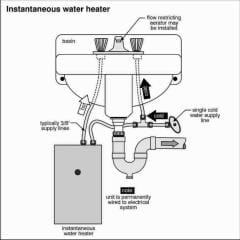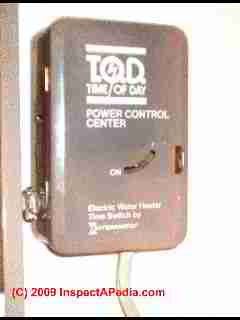 Hot Water Heater Timer Recommendations for Energy Savings
Hot Water Heater Timer Recommendations for Energy Savings
- POST a QUESTION or COMMENT about how to install, set, use, and troubleshoot electric water heater timer controls
Guide to water heater timers for energy savings:
This article explains how discuss the use of timers to control electric water heaters and tankless electric water heaters.
This article contains links to in-depth articles on inspecting, testing, and repairing problems residential hot water heaters of all types, including their parts, controls, and alternative sources for hot water as well as tips for improving hot water temperature, hot water pressure, and hot water quantity.
InspectAPedia tolerates no conflicts of interest. We have no relationship with advertisers, products, or services discussed at this website.
- Daniel Friedman, Publisher/Editor/Author - See WHO ARE WE?
Guide to Using Timers on Residential Hot Water Heaters
The sketch above shows the basic components of an electric water heater and is provided courtesy of Carson Dunlop Associates, a Toronto home inspection, education & report writing tool company [ carsondunlop.com ].
This article contains links to in-depth articles on inspecting, testing, and repairing problems residential hot water heaters of all types, including their parts, controls, and alternative sources for hot water as well as tips for improving hot water temperature, hot water pressure, and hot water quantity.
Also see Energy Efficient Water Heating, a US Department of Energy, a PDF file that provides tips on lowering your water heating bill.
The link to the original Q&A article in PDF form immediately below is followed by an expanded/updated online version of this article.
- Q&A on Using Timers on Electric Water Heaters & Tankless Water Heaters - original PDF version, use your browser's back button to return to this page
The question-and-answer article below paraphrases, quotes-from, updates, and comments an original article from Solar Age Magazine and written by Steven Bliss.
Water Heater Timers
Question:
Does it make sense to put a timer on an electric hot water tank to turn it off for most of the day if no one will be home?
 How about using a timer on a tankless electric water heater if gas is not available? -- Bill Geary, Belfair WA
How about using a timer on a tankless electric water heater if gas is not available? -- Bill Geary, Belfair WA
Answer:
Efficiency of Timers on Conventional Electric Water Heaters
According to Princeton Energy engineer Gautam Dutt, the idea of using a timer on an electric water heater will work fairly well if your daily hot water consumption is less than one water-tank load, or if the hot water heater will be shut off for several days at a time, such as over a long weekend.
For shorter time periods or for higher hot water consumption rates, in the 1980's Dutt thought that it would be more practical to insulate the water tank.
However modern hot water tanks come from the manufacturer with good insulation, and in some cases insulating a hot water heater tank may fail to follow the manufacturer's instructions, could void its warranty, or could make the water heater unsafe (if for example you covered the pressure-temperature relief valve). --DF
In the 1980's a typical stock electric water heater was about 73-percent efficient, including tank losses. If you included hot water delivery piping losses, the efficiency of the water heating system drops to about 60 percent. This is a good incentive to add insulation on your hot water piping, and it may help you decide on using a water heater timer too.
At WATER HEATER EFFICIENCY we provide a comparison of the efficiency of different types of water heaters.
What is the Energy Efficiency of Electric Tankless Water Heaters?
 Dutt said that tankless electric hot water heaters work best if the hot water demands are low, and if points of hot water use are clustered in the building (as opposed to having the tankless water heater deliver hot water through long pipe runs to distant points of use from the heater itself).
Dutt said that tankless electric hot water heaters work best if the hot water demands are low, and if points of hot water use are clustered in the building (as opposed to having the tankless water heater deliver hot water through long pipe runs to distant points of use from the heater itself).
Obviously this is easier to achieve in new construction than in a hot water heating retrofit.
We add that because tankless water heaters have zero or very low stand-by losses, there would be typically be no gain achieved by installing a timer on an electric tankless water heater. -- DF
Drawbacks of electric tankless hot water heating systems are that they draw high electrical current (amperage) and supply low hot water flow rates. This means that from a modest-sized tankless electric hot water heater system you can't shower and wash dishes at the same time, and low hot water-demand appliances are in order as well.
Consumer Reports points out that a tankless water heater may be efficient but not necessarily economical to operate. What they mean is that it is certainly efficient to avoid heating water when no one is using it. But if water usage is high, a high-BTU tankless water heater may consume more total energy than a large but more conventional oil or gas fired hot water tank and burner.
See TANKLESS WATER HEATERS and Should I Convert to a Tankless Heater? for more about these systems.
Sketch (above) of a point of use tankless water heater courtesy of Carson Dunlop Associates, a Toronto home inspection, education & report writing tool company [ carsondunlop.com ]. Our OPINION is that readers looking for plenty of hot water heated efficiently should also consider the heater we describe at Indirect-fired Water Heaters.
Readers should also see ALTERNATIVE HOT WATER SOURCES to distinguish among these types of hot water producing systems and see Electric Shower Heaters for a discussion of point of use heaters at shower heads.
If your hot water is not working, check the water heater timer:
Some electric water heaters are installed with a timer (photographs above) that saves electricity costs by turning off the heater during periods when no one will be using hot water.
If a timer is installed for your heater, it might be in its "off" position. Instructions for setting the water heater timer are inside the timer cover.
WATER HEATER PROPERTIES discusses water heater types and their efficiencies; there we also note that using a water heater at a high duty cycle (such as heating a home) may shorten its life.
Also see Energy Efficient Water Heating [PDF] U.S. Department of Energy, a PDF file that provides tips on lowering your water heating bill.
...
Reader Comments, Questions & Answers About The Article Above
Below you will find questions and answers previously posted on this page at its page bottom reader comment box.
Reader Q&A - also see RECOMMENDED ARTICLES & FAQs
Question:
(Mar 12, 2015) Peter Heier said:
Our electric water heater produces greater quantities of hot water than required. Would it save energy to disconnect the lower element; in other words, would the lower portion of the water remain relatively cool?
Reply:
Peter
I'd start by looking at the manual for your heater to see how its elements work. On many water heaters the second element does not come on until demand causes its operation.
Since stand-by losses are not great on modern water heaters, I'm not sure what we'd gain - let me know your heater's brand and model and we'll dig into this a bit more.
...
Continue reading at ELECTRIC WATER HEATER CONTROLS or select a topic from the closely-related articles below, or see the complete ARTICLE INDEX.
Or see these
Recommended Articles
Suggested citation for this web page
TIMERS for ELECTRIC WATER HEATERS at InspectApedia.com - online encyclopedia of building & environmental inspection, testing, diagnosis, repair, & problem prevention advice.
Or see this
INDEX to RELATED ARTICLES: ARTICLE INDEX to WATER HEATERS
Or use the SEARCH BOX found below to Ask a Question or Search InspectApedia
Ask a Question or Search InspectApedia
Try the search box just below, or if you prefer, post a question or comment in the Comments box below and we will respond promptly.
Search the InspectApedia website
Note: appearance of your Comment below may be delayed: if your comment contains an image, photograph, web link, or text that looks to the software as if it might be a web link, your posting will appear after it has been approved by a moderator. Apologies for the delay.
Only one image can be added per comment but you can post as many comments, and therefore images, as you like.
You will not receive a notification when a response to your question has been posted.
Please bookmark this page to make it easy for you to check back for our response.
IF above you see "Comment Form is loading comments..." then COMMENT BOX - countable.ca / bawkbox.com IS NOT WORKING.
In any case you are welcome to send an email directly to us at InspectApedia.com at editor@inspectApedia.com
We'll reply to you directly. Please help us help you by noting, in your email, the URL of the InspectApedia page where you wanted to comment.
Citations & References
In addition to any citations in the article above, a full list is available on request.
- Steve Bliss's Building Advisor at buildingadvisor.com helps homeowners & contractors plan & complete successful building & remodeling projects: buying land, site work, building design, cost estimating, materials & components, & project management through complete construction. Email: info@buildingadvisor.com
Steven Bliss served as editorial director and co-publisher of The Journal of Light Construction for 16 years and previously as building technology editor for Progressive Builder and Solar Age magazines. He worked in the building trades as a carpenter and design/build contractor for more than ten years and holds a masters degree from the Harvard Graduate School of Education. Excerpts from his recent book, Best Practices Guide to Residential Construction, Wiley (November 18, 2005) ISBN-10: 0471648361, ISBN-13: 978-0471648369, appear throughout this website, with permission and courtesy of Wiley & Sons. Best Practices Guide is available from the publisher, J. Wiley & Sons, and also at Amazon.com - American Council for an Energy Efficient Economy, American Council for an Energy-Efficient Economy,
529 14th Street N.W., Suite 600,
Washington, D.C. 20045-1000, (202) 507-4000
E-mail: aceeeinfo@aceee.org
E-mail: ACEEE_Publications@aceee.org - www.aceee.org/ - original source for comments in this article|:: http://www.aceee.org/Consumerguide/waterheating.htm - GAMA data base of water heater efficiencies: http://www.gamapower.org/water.php
- Energy Efficient Water Heating, US Department of Energy, provides tips on lowering your water heating bill
- Carbon Monoxide Gas Toxicity, exposure limits, poisoning symptoms, and inspecting buildings for CO hazards
- National Fuel Gas Code (Z223.1) $16.00 and National Fuel Gas Code Handbook (Z223.2) $47.00 American Gas Association (A.G.A.), 1515 Wilson Boulevard, Arlington, VA 22209 also available from National Fire Protection Association, Batterymarch Park, Quincy, MA 02269. Fundamentals of Gas Appliance Venting and Ventilation, 1985, American Gas Association Laboratories, Engineering Services Department. American Gas Association, 1515 Wilson Boulevard, Arlington, VA 22209. Catalog #XHO585. Reprinted 1989.
- SOLAR WATER HEATERS [PDF] , U.S. Department of Energy article on solar domestic water heaters to generate domestic hot water in buildings, explains how solar water heaters work. Solar heat for swimming pools is also discussed.
- SOLAR WATER HEATERS [PDF] , U.S. Department of Energy article on solar domestic water heaters to generate domestic hot water in buildings, explains how solar water heaters work. Solar heat for swimming pools is also discussed.
- HEAT EXCHANGERS for SOLAR WATER HEATING SYSTEMS [PDF], U.S. DOE describes the types of solar water heater heat exchange methods between the sun and the building's hot water supply
- HEAT-TRANSFER FLUIDS for SOLAR WATER HEATING SYSTEMS [PDF] , U.S. DOE, describes the types of fluids selected to transfer heat between the solar collector and the hot water in storage tanks in a building. These include air, water, water with glycol antifreeze mixtures (needed when using solar hot water systems in freezing climates), hydrocarbon oils, and refrigerants or silicones for heat transfer.
- SOLAR WATER HEATING SYSTEM MAINTENANCE & REPAIR [PDF] , U.S. DOE
- In addition to citations & references found in this article, see the research citations given at the end of the related articles found at our suggested
CONTINUE READING or RECOMMENDED ARTICLES.
- Carson, Dunlop & Associates Ltd., 120 Carlton Street Suite 407, Toronto ON M5A 4K2. Tel: (416) 964-9415 1-800-268-7070 Email: info@carsondunlop.com. Alan Carson is a past president of ASHI, the American Society of Home Inspectors.
Thanks to Alan Carson and Bob Dunlop, for permission for InspectAPedia to use text excerpts from The HOME REFERENCE BOOK - the Encyclopedia of Homes and to use illustrations from The ILLUSTRATED HOME .
Carson Dunlop Associates provides extensive home inspection education and report writing material. In gratitude we provide links to tsome Carson Dunlop Associates products and services.


